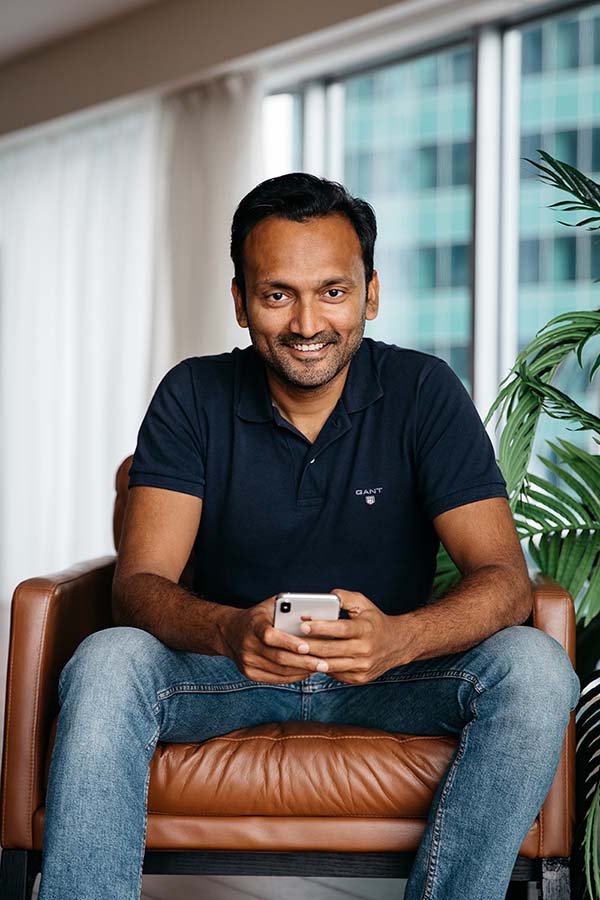Gaurav Goel was born in India and earned an engineering degree before coming to study management at the ESCP Paris Campus, partially influenced by his interest in French culture. After graduating, he worked for seven years in M&A at Goldman Sachs and three years in private equity at Astorg. He then decided to venture into entrepreneurship and created StayTouch, a smart networking and contact exchange application based on contactless technology. Though the app was designed in 2018, StayTouch discovered a new kind of relevance in 2020, during the Covid-19 pandemic.
A four-stage process and a tipping point
Entrepreneurship is part of Gaurav’s DNA and was a logical step for him, as he comes from a family of entrepreneurs. “My dad was entrepreneurial from day one – he established his own business. My granddad was an entrepreneur, as well, and when I was a kid, I used to go to his factory where I played every day.”
Inheriting this entrepreneurial disposition was the cornerstone, but Gaurav took the time to let his project mature over four stages of his life. If his family environment taught him from a young age how a company works, his engineering studies taught him how to solve problems. Then his Master in Management at ESCP gave him the keys to management, and finally, his experience in finance allowed him to put everything into practice, to be aware of what investors expect, and to build his network.

Gaurav remembers all too well when he made the decision that changed his life. “On 24 August 2017, I spent a week-end collecting and reorganising business cards in my office and realised I couldn’t remember the details of my contacts. It really changed everything for me. I needed an additional or an automatic memory of my meetings and I was frustrated because I couldn’t find a solution. Nothing could give me information automatically. I started asking around and soon realised that everybody faced the same problem in some form or another.”
That’s when he decided to create the solution that would allow him to solve this problem. Seeing a true market opportunity, he left the world of finance to create StayTouch: the app that allows users to stop wasting time managing business cards or virtual networking. With the effortless touch of two smartphones, meeting details and up-to-date profiles are automatically exchanged and saved with quintessential memory of every meeting – date, time, place, meeting notes and participants.
Covid-19: the tipping point
The app met with success when in 2020 the pandemic hit and, like for many people, revolutionised Gaurav’s life: “At the first two weeks of the Covid lockdown, I was scared because my App was about contact exchanges and people didn’t meet anymore. But it gave us a real opportunity to grow up, as StayTouch gives users the possibility to exploit one’s own network – without physical contact. Covid-19 gave us a real additional growth factor – demand for contactless technology.“
Gaurav’s vision took a completely different direction from the original objective, and StayTouch became a real platform, based on contact monitoring.
Gaurav’s idea was a two-step process. Originally, the application was made for the follow-up of professional business cards: Ten million cards are printed every year in the United States alone. When physical contact was put to a temporary stop, this situation changed, but everyone kept their smartphone and network tracking solutions were still essential. Current solutions proved insufficient. Even on LinkedIn, it is not easy to manage and track the history of exchanges, according to Gaurav. Hence he decided to develop his application by proposing virtual meeting spaces. A solution that found a large audience, sensitised by the pandemic.
Covid has given us the right time for the right market. It was easier to talk to people and to explain the personal and professional use cases of StayTouch.
Recently, new features have been added such as sharing with your contacts tips for places-to-go. This allows users to stay in touch with their close contacts, similar to social media platforms but without the fear of advertisements or data leaks.
Working from home has accelerated the need for efficient networking platforms. Incumbents like LinkedIn do not answer this new shift in paradigm, Gaurav says. He believes that efficient networking is about the ability to exchange contacts during physical and virtual meetings effortlessly and then to be able to remember the person, whether it is a business associate, family or friend.
How can you manage your network effectively?
These are paradoxical times. There have never been so many opportunities for conferences and exchanges, without leaving your home or office, but there are very few ways to have real opportunities to meet when meeting physically is impossible. Above all, Gaurav warns of webinar fatigue.
“We are social animals and virtual events create some disorientation. So I would advise you to not follow too many events but to have a few where you think connections can be more personal. Take the right notes, have a break and then after the meeting, contact the speaker to enrich your knowledge. Take genuine initiatives to nurture the relationship.“

When the situation returns to normal, Gaurav predicts that the return to physical contact will take over again, as he believes that important decisions still require face-to-face meetings, from a simple contract to key projects. Gaurav himself continues to travel and meet with investors and decision-making bodies, while working virtually with his teams, advisers, and professors from several universities. He has made a major point of working with schools and offers meeting spaces for students to connect with recruiting companies. According to him, the link with students is essential. “Working with schools is important. Students don’t realise that they should nurture their network during their university years. Students have to know that their first professional network is their classmates and that it is highly advantageous in the long term.”
His keys to management: the diversity of teams and the sense of responsibility.
Gaurav’s collaborators come from all over the world and 60% are women. “Diversity is only possible when you open your mind. For me, thinking globally is very important. You have to understand the cultural differences and diversities, and in my team, everybody has something to contribute.”
For Gaurav, this approach to management is part of his long-term vision that also encompasses sustainable development.
According to him, “In a business, you have to be a bit crazy and you need to have a vision and not just a short one, but a long-term vision. We need to be sustainable so as to live together in a better world”.
License and Republishing
The Choice - Republishing rules
We publish under a Creative Commons license with the following characteristics Attribution/Sharealike.
- You may not make any changes to the articles published on our site, except for dates, locations (according to the news, if necessary), and your editorial policy. The content must be reproduced and represented by the licensee as published by The Choice, without any cuts, additions, insertions, reductions, alterations or any other modifications.If changes are planned in the text, they must be made in agreement with the author before publication.
- Please make sure to cite the authors of the articles, ideally at the beginning of your republication.
- It is mandatory to cite The Choice and include a link to its homepage or the URL of thearticle. Insertion of The Choice’s logo is highly recommended.
- The sale of our articles in a separate way, in their entirety or in extracts, is not allowed , but you can publish them on pages including advertisements.
- Please request permission before republishing any of the images or pictures contained in our articles. Some of them are not available for republishing without authorization and payment. Please check the terms available in the image caption. However, it is possible to remove images or pictures used by The Choice or replace them with your own.
- Systematic and/or complete republication of the articles and content available on The Choice is prohibited.
- Republishing The Choice articles on a site whose access is entirely available by payment or by subscription is prohibited.
- For websites where access to digital content is restricted by a paywall, republication of The Choice articles, in their entirety, must be on the open access portion of those sites.
- The Choice reserves the right to enter into separate written agreements for the republication of its articles, under the non-exclusive Creative Commons licenses and with the permission of the authors. Please contact The Choice if you are interested at contact@the-choice.org.
Individual cases
Extracts: It is recommended that after republishing the first few lines or a paragraph of an article, you indicate "The entire article is available on ESCP’s media, The Choice" with a link to the article.
Citations: Citations of articles written by authors from The Choice should include a link to the URL of the authors’ article.
Translations: Translations may be considered modifications under The Choice's Creative Commons license, therefore these are not permitted without the approval of the article's author.
Modifications: Modifications are not permitted under the Creative Commons license of The Choice. However, authors may be contacted for authorization, prior to any publication, where a modification is planned. Without express consent, The Choice is not bound by any changes made to its content when republished.
Authorized connections / copyright assignment forms: Their use is not necessary as long as the republishing rules of this article are respected.
Print: The Choice articles can be republished according to the rules mentioned above, without the need to include the view counter and links in a printed version.
If you choose this option, please send an image of the republished article to The Choice team so that the author can review it.
Podcasts and videos: Videos and podcasts whose copyrights belong to The Choice are also under a Creative Commons license. Therefore, the same republishing rules apply to them.





